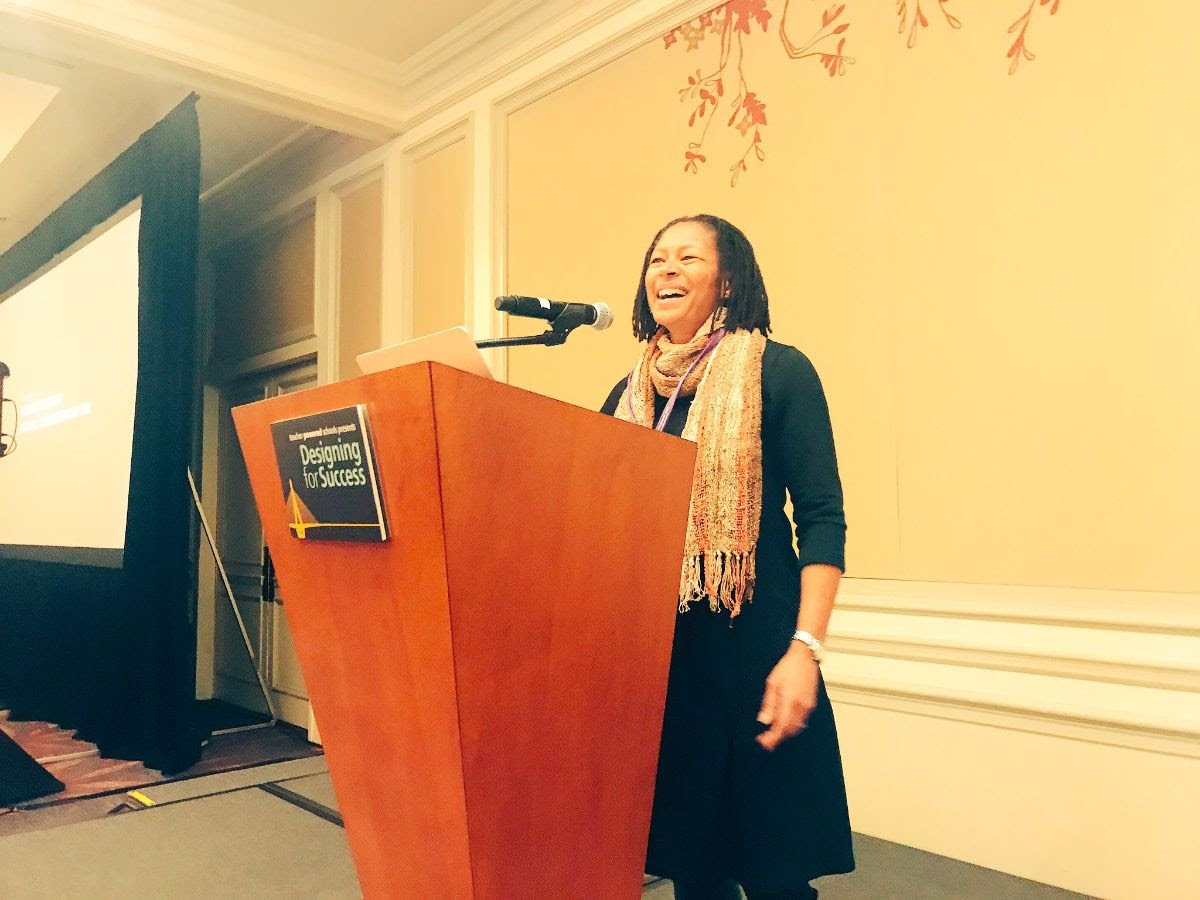Danny Flannery is a 1st/2nd grade teacher at Mission Hill School. He also works as a teacher-powered ambassador.
Mission Hill School, a Boston Public Pilot School, opened its doors in 1997 with one principal, Deborah Meier, and over the first decade of the school’s existence it had a variety of leadership structures—always rooted in democratic governance and school-wide decision making by staff. Ayla Gavins has served as the principal of Mission Hill School for the past twelve years, and will be leaving her role at the end of this school year. She will be replaced by two Teacher Leaders who will take on the responsibilities of the principal going forward.
This interview has been lightly edited for length and clarity.
Danny: For anyone who has worked as a school administrator or has worked closely with one, you get an appreciation for how multifaceted, time consuming, and just plain overwhelming the job is. The first question I have is a simple one, but I just wanted to give you the opportunity to pause and reflect: With about three months left in your role as principal, how are you doing?
Ayla: I am laser-focused in some ways and really unclear in other ways. In terms of laser-focus I find myself being more critical because I want to make sure that I’m not leaving our school with any “I wish I had” thoughts, and I’m also really unclear because there are so many great things about this school. It is just an amazing community and the more I travel, the more I see and know how special this place is, and so it’s not an easy place to leave. At the same time, there have been many times before I decided to move on when I thought other people should experience this role, so I’m happy that it’s happening.
It’s a difficult decision to leave a job, but it’s another thing entirely to leave and write your own job out of existence. Why did you decide to propose having two Teacher Leaders?
I ultimately wanted to protect the school. Our school is incredibly unique and there aren’t many like it in existence. I thought about some of the things that have made it hard for schools like ours to remain true to their mission and just exist, and then I started thinking “What could protect our school while we’re still OK?” One of those thoughts was to have leadership be part of a union, and also to have two people because there’s a lot that happens within a schoolhouse but there’s also a lot that happens outside of the schoolhouse. It’s just really helpful to have two people, especially in the times that we’re in where schools are threatened every day.

What was the process for making this change to two Teacher Leaders?
First I started with our staff. About maybe three or four years ago at a winter retreat I gave a five year notice letting people know that I was ready to step down. Our school over the past seven or eight years has had different difficult situations put upon us from our central office. There were also families that rocked our boat sometimes, so I would never want to leave while things felt unsteady, but I did let people know that I felt it would be best for the school that after my ten years someone took on the leadership. I just thought it would be healthy for the school. For the first few years no one responded, then someone said “I could imagine myself doing that, but not by myself.” That’s when I started thinking we could have a team do this and that would be fantastic. So that was the beginnings of the idea.
I then took the idea to two high level position folks in central office—the head of the budget department and the head of academics. They both saw it as feasible when we walked through it. Before I took it to the broader community I wanted to make sure it could actually happen. Then I took it to the broader staff, and then the board, just to think about; that was last spring. Then this fall, I took it back to central office, brought it back to the staff, brought it back to the governance board. Eventually the board voted to pass the idea.
There were then lots of things to work out with central office because it has lots of different departments and each one has decision making power, so there was quite a lot of back and forth. I think the key to getting it all approved was just holding steady and not straying too much from a reasonable process. Getting tangled up with central office, they start asking for lots of things to happen and be done, and I just kept replying “Why? Here’s what we’ve done, here’s where we’re going. I think this is appropriate, I think this is not appropriate.” Finally we got through our biggest hiccups: a financial one which was ironed out, but again that took a lot of back and forth, and also language in the job description, where the teachers’ union wanted to make sure there was a pay differential which is really important so I’m glad that that’s happening. So lots of going back and forth, but finally we got it done.
How do you think Mission Hill will change once it has two Teacher Leaders? What do you think will remain the same in governance and day to day operations?
I’m hoping that there will be even more distributed leadership. I’m also hoping that there will be more coaching and more direct student support. I think that’s very possible and that’s part of why we’re doing this so I’m hoping that those will be some changes. People will have more face time with the school leadership.
What do I hope will stay the same? I’m hoping that our Statement of Purpose will remain the same and we’ll continue to try to live and actualize that. I’m hoping that the arts as being central to what we are and community voices being central to what we are will stay the same.
You said that student support will improve by having two teacher leaders. What do you think that will look like?
So right now in my day, for students who have challenges, often I listen and hear situations that aren’t going so well. I then insert myself, but ideally I would be in rooms more and able to be part of a regular plan for a kid. I’m hoping that with the two teacher leaders they can be part of a regular plan. Because they’re not learning coaches and they don’t have a classroom base, the “unexpecteds” or if some kid needs something a little extra—they can provide that.
I don’t know if you’ve thought about this but there are students at Mission Hill today who started their education at Mission Hill School and have only known you as principal. How do you think they would describe their time at Mission Hill?
Well, one of those students this morning told me about their high school acceptance, and tells me any time something isn’t going as expected for Mission Hill School. There’s a crew of kids who’ve developed high expectations for their kids and for what they should be getting at the school because they’ve been here for years. I would say they expect and demand to have respectful teachers that are focused on learning, and when that doesn’t happen I hear about it, and I usually hear about it from the kids who have been here the longest.
So they seek out help when something is not as it should be, but do you think they’d describe their time as inconsistent, or mostly solid experiences grade to grade?
They would describe their experiences as… gosh, I’m thinking about a number of students so it kind of depends on the student. The one that came to me this morning has already described their experience as consistent up to a point, and then we had some staffing disruptions that they named. Last year they repeatedly told me that they needed a teacher that was going to stay, because that’s the expectation. You’re supposed to have your teacher for two years, and if that doesn’t happen, that’s unusual. I also know that kids understand their experience here as project-based, and that’s an expectation that they have.
You referenced earlier not wanting to have any “I wish I hads”, but are there any plans or initiatives you’re still working toward getting off the ground in your last three months?
There are some things that I wish were done before that I wish hadn’t stopped. Yesterday, you were talking about book buddies and partnerships across grades and I thought “Oh right, why did we fall off the wagon with that one?” So every now and then there are things that I thought were great and then we just didn’t sustain. It’s the same with Passport Math, why did we ever stop doing that? That was a mistake.
There are things around inclusion that I wish I had more time to work on, but I also won’t leave worried that things will fall apart there. I’m really confident in our team that things are going to move forward. There are just some more progressive moves we could make with inclusion, and I think some of that requires not just us but some work with central office because they have to think more progressively in order for us to do some things.
Do you think there’s some sort of mechanism missing that allows for things to fall off our radar, some way that we could work to keep those routines and structures?
I think as people stay on in years, things become kind of second nature and they don’t get talked about anymore. Or a new idea is tried and there isn’t a check-in to go back to how things work. Or we take a little break and just never go back. I think documentation would be helpful, and we’ve gotten way better at that, but also another school leader was telling me about their beginning of the year and how there are some elements that are revisited every single year. Our process has a structure that exists every year, but the topics come from the community, so you could spend an entire year not talking about something if somebody doesn’t put it on the agenda.
Another “I wish I had” related to the new teacher leaders coming in is about communication and consistency with ideas. I worked at a school once where we had a weekly bulletin and everybody was responsible for reading it every week. We’re sort of at a size and at a point where we have people who are not with us all week, where we need another form of communication. If I was still here next year, I’d start a weekly bulletin that just highlights from the Business Meeting, some instructional look-fors, just a few things so that everybody gets the information.
Now I know you’ve been getting this question a lot, but you did say you’d be thinking about it over February break, so I feel like it’s okay to ask you again: As you leave your role as principal at Mission Hill, what is next for you?
I still don’t know what’s next! Let’s see, I have been approached from a search team for a nonprofit, the Center for Collaborative Education, that’s looking for an executive director. I decided that even though I’m not sure I’m the best person for the job that I would follow through on the process, so I will interview there. I also saw a position for the Department of Education that’s looking at building teacher effectiveness, so I’m going to apply to that position. I saw a position in Cambridge that was just for an assistant principalship, and I’m going to apply to that. I looked at a director of instruction position at a local school and decided I will not go for that. In terms of teaching positions, I have one offer to teach an eighth grade ethics class, and that is kind of exciting. For parents here, a number of them have gone through the resumes and said “I thought you were going to apply for a teaching position here.” I decided not to do that because of some coaching and counseling I got from people about what it’s like to have the school leader still in the building when other people are hired. Also thinking about Debbie (Meier) when I got this job, and calling her just because she’s been my mentor and I just love her forever, and she said to me “You do understand this is your school now?” and I said “Yeah I know, I know.” So I just want to be able to say that to the new teacher leaders: “This is you now”, and I’m not around making things muddy.
Last question, kind of big picture: if you could identify one concrete step that school administrators across the country could take to improve the lives of their students, what would it be?
That’s tough. So, one would simply be “be present” because I know from my colleagues some often stay in an office all day and they’re just not visible. Kids don’t even know who they are. So that would be my first thing, to be present and have contact and engage with kids about their work. They need as many people seeing them as intellectuals as possible. Then I would say to establish a relationship with every single teacher and everybody who’s connected to instruction so that they see themselves as intellectuals but also as powerful people. No matter where someone is in the phase of developing as a teacher, as long as they’re on that trajectory, you can walk away and know that something better is going to happen. It might not be perfect or the way you would’ve done it, but that means the next time they’re going to be even stronger. I think that is part of how schools become great. It’s this collection of individuals that are all becoming stronger every single day until you have this powerhouse, which is what I think we have.
End of interview.
As we begin our interview process for our new Teacher Leaders, it is with an air of excitement for the future of Mission Hill School, as well as an appreciation for everything that Ayla has brought to our school community as principal over the last twelve years. Through times of success and times of challenge, Ayla could be counted on not just as an advisor and a mentor but also as a powerful voice for progressive education and democratic principles. Ayla always put our students’ learning at the center of her work, and we at Mission Hill School are looking forward to seeing what amazing things she does next. Once a Mission Hiller, always a Mission Hiller!
Find Danny Flannery on Twitter at @teacherdanny216.
 NEWSLETTER SIGN-UP
NEWSLETTER SIGN-UP




